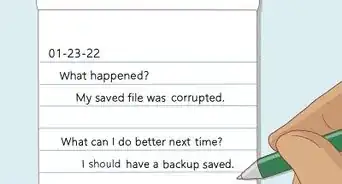This article was co-authored by Meredith Walters, MBA. Meredith Walters is a Certified Career Coach who helps people develop the skills they need to find meaningful, fulfilling work. Meredith has over eight years of career and life coaching experience, including conducting training at Emory University's Goizueta School of Business and the US Peace Corps. She is a former Member of the Board of Directors of ICF-Georgia. She earned her coaching credentials from New Ventures West and a Master of Business Administration from the University of San Francisco.
There are 10 references cited in this article, which can be found at the bottom of the page.
This article has been viewed 41,026 times.
Simply showing up to work and doing the bare minimum is rarely sufficient to earn you a promotion or glowing recommendations when searching for new jobs. In order to get ahead, you need to not only perform your duties competently, but excel at them. Learning how to do your job well from the very beginning is an important first step. Once you have streamlined your performance, taking more and more initiative is critical to ensuring your success. Equally important is creating and maintaining a strong working relationship with your coworkers and supervisors.[1]
Steps
Maximizing Your Performance
-
1Find a position that matches your interests. Make work a positive experience by taking a job that you actually want. Increase your motivation to excel by accepting a role whose challenges mirror your own personal ambitions.[2] Whether you are seeking employment at a new organization, looking to transfer from within, or reconsidering your current position, ask yourself the following to determine whether the job at hand is right for you:[3]
- Do I enjoy the tasks demanded by this position?
- Do these tasks play to my strengths?
- Would I contribute my best to the company in this position or elsewhere?
-
2Break your duties down into micro-tasks. Resist the temptation to tackle everything with maximum efficiency all at once. Improve your performance bit by bit instead. Sketch a timeline of your workday, listing your duties hour by hour. Select the first one or two and then outline the specific tasks that each one involves. Think of ways that you can improve your performance with each individual task in order to streamline the whole process.[4]
- As you implement these changes, move on to the next hour. Continue to do so until you have streamlined your whole workday.
- If your workdays vary in nature from one day to the next, perform this same practice for each distinctive day.
- Once you have streamlined each workday, think bigger. Consider weekly, monthly, or even yearly goals. Work backwards from the end date to see how tweaking this or that daily micro-task might be increase your chances of meeting those goals even further.
Advertisement -
3Use time wisely. Make the most of your time on the clock.[5] Reduce the risk of burnout and/or mistakes that comes from cramming too much work into too little time in order to compensate for lost opportunities. Prioritize working for sustained periods at a reasonable pace over sneaking in as many breaks as possible and making up for it later. Maintain your output and sanity at the same time.
- Arrive early enough so that you can take care of all the little things (settling in, making coffee, using the bathroom) before starting time.
- Abstain from distractions like computer games, social media, and personal messaging through phone, text, and/or email.
- Use downtime to catch up on backlogs, prep for future tasks, or give yourself a headstart by diving right into them.
-
4Take sensible breaks. Give yourself a refresher by stepping away from work once every hour. Research has shown that productivity among workers actually increases when they take a 17-minute break for every 52 minutes of work. However, keep in mind that this exact formula may not apply to every single person. Also bear in mind that your employer may enforce a strict policy of how much break-time employees are entitled to.[6] [7]
- 'Recognize the warning signs. If you find it harder and harder to concentrate on the task at hand without woolgathering, take that as a sign to step away.
- Use the bathroom or a coffee refill as an excuse to walk away if you aren’t permitted to take breaks at your own discretion.
-
5Make the most of your breaks. Wake your mind and body up with physical activity if you sit or stand in place for the majority of your work-time. Or, if your job is physically demanding, take a catnap on your designated break. Also, socialize with other workers as a way to engage your brain with something other than work.[8] [9]
- Take a walk around the block or parking lot as a way to move. Climb stairs if you are granted access to the building’s stairwells. Or do some push-ups, jumping jacks, or other light exercise where you can.
- Be careful not to interrupt other coworkers from their own tasks by starting a conversation. Coordinate breaks with your colleagues if possible, or use this time to return personal calls.
-
6Evaluate your performance in a journal and/or calendar. Keep a daily log of your goals for a given day and what you actually achieved. Include any new methods or ideas that helped accomplish these goals or even exceed them. Also include any factors that prevented you from meeting your aims. Add weekly and monthly summaries to track your progress with meeting long-term goals. Use these records to:[10]
- Mark positive changes to your performance so you can implement them further.
- Identify areas that need more focus and improvement.
- Anticipate setbacks beyond your control in order to preempt or plan around them if they repeat themselves in the future.
-
7Use external motivation. Whether you are striving for a promotion, raise, or bonus, or if you just happen to be one of many who feel no particular passion for their current job, use your personal goals and responsibilities as motivators. Mark your calendar with outside achievements you hope to meet by this or that date. Adorn your workspace with imagery or symbols that will constantly remind you of what you are working for. Hold yourself accountable to what you do love in life in order to excel.
- Mark your calendar with rewards that you aspire to, such as earning a promotion or buying a new car or house.
- Also note down due dates for your bills and debts, the amounts you hope to pay each cycle, and your projected date for final payment as motivators.
- Hang pictures of your family or even that new car you hope to buy in your workspace.
- If that’s not possible, use another object that visually reminds you of your motivation, like a coffee mug that was a gift from your daughter, or a keychain from that coveted car company.
Taking the Initiative
-
1Consider yourself a permanent student. As you become more proficient in your field, avoid the temptation to confuse this with a total mastery of anything and everything related to it. Instead, take advantage of every opportunity to learn something new. Embrace every new fact, idea, and method that may improve your work performance.[11]
- Subscribe to newspapers, magazines, podcasts, blogs, and/or business book clubs that report on your trade or issues that it faces.
- Keep up to pace with evolving technology to spot new ways that it could streamline your duties.
- Value new workers who can teach something new, even when their position is lower than yours in the organization’s hierarchy.
-
2Embrace new challenges. Resist the urge to avoid anything new just because it may seem difficult at first. Appreciate the difference between good stress and bad stress. Regard your brain’s needs as being equivalent to your body’s, in that it needs stress in order to grow (the same way you need the physical stress of doing curls in order to build your biceps). Exercise your brain accordingly while expanding your know-how. Expect a rejuvenated feeling of self-confidence and satisfaction upon completion of tough projects.[12]
- Recognize good stress from bad by the element of control. Stress becomes detrimental when you begin to feel helpless.
- Take a step back from your work whenever you feel like you have bitten off more than you can possibly chew. Reappraise the situation and formulate a new strategy if the old one isn’t working.
- Working in a positive team environment helps reduce bad stress by offering a greater number of fresh perspectives when the going gets rough.
-
3Involve yourself in the growth of the organization. Don’t wait to be handed down directives and mission statements. Take an active role in shaping the organization from within. Present yourself as a key player in its future while demonstrating your investment in its success.[13]
- Establish regular meeting with your supervisor to discuss ways in which your position and/or department can be improved.
- Offer your services for new assignments or projects. Display both your willingness and capabilities while also gaining firsthand knowledge of where the organization is headed.
- Volunteer to train new hires and underperforming employees. Prove yourself to be a team player to your supervisors. At the same time, place yourself in a position to spot future potential in recent hires and resolve problems contributing to underperformance.
-
4Set your ego aside. Embrace both positive and negative feedback. Reward your efforts by accepting commendations for your accomplishments.[14] At the same time, value critical feedback as being equally vital to your success. Maintain a clear distinction between your potential and your current abilities and performances. Honor your potential by striving to embody it, but keep an honest perspective on how far you have left to go.[15]
- Accept supervisors’ decisions not to move forward on your suggestions. Ask for specific reasons for their decision. Use these to either reformulate your initiatives so they incorporate your supervisors’ concerns, or devise entirely new plans to meet their expectations.
- Embrace failed or lackluster projects as learning experiences. Review your performance to spot potential alternatives you might have taken to achieve a more positive result. Welcome recommendations and constructive criticism from supervisors and coworkers.
- Listen to concerns and questions from underperforming workers and new hires. Use their input to identify areas where the organization could improve to ensure better productivity.
Creating Positive Working Relationships
-
1Conduct yourself professionally. Some organizations may be more casual in approach than others, but respect the fact that each one is an institution with a stated purpose. Conform to the demeanor expected of employees. Foster a positive impression with your employers and coworkers by:[16]
- Following dress codes.
- Obeying rules and codes of conduct.
- Treating others with respect.
- Setting personal matters aside while on the job.
- Abstaining from office gossip.
-
2Learn about your organization. Present yourself as part of the team, rather than an individual who just happens to clock in here for a paycheck. Think of the organization the way you would with a significant other. Learn its wants, needs, and concerns. Demonstrate to your employers and colleagues that you are fully invested in the organization’s well-being, and thus theirs. Aim to understand the following:[17]
- The organization’s main mission.
- Its history, present situation, and future goals.
- Obstacles that it faces.
- Weaknesses to be overcome.
- Strengths to be employed.
-
3Anticipate your supervisor’s needs. Do the obvious and follow their stated expectations of you. At the same time, pay close attention to their own workday. Note the issues they face on a day-to-day basis. In addition to following the basic duties of your position, develop strategies that will anticipate those issues so they can be preempted or at least minimized. Create a symbiotic relationship with your supervisor so you can become indispensable to them.[18]
- Play to their preferences. Learn how often they expect to be updated on progress. Use whichever means of communication they prefer (email, phone, meetings). Tailor your updates to emphasize information they prioritize.
- Volunteer what you know they will ask of you. As your working relationship becomes more routine, use your prior experience to guess what they will need next from you. Offer to do it before they think to ask it, thus demonstrating your initiative and adaptability.
- Become the yin to their yang. Identify areas in which your supervisor proves to be consistently weak. Use your own strengths to make up the difference and improve your department’s overall performance.
-
4Be a positive role model. Create a working environment that people are glad to join instead of eager to leave. Recognize challenges and hardships as they appear and address them as such to maintain credibility, but accentuate the positive to increase optimism. Reinforce your coworkers’ attitudes by:[19] [20]
- Regularly expressing gratitude for others’ contributions in a natural, casual manner, thus avoiding the impression that your thanks is staged or forced.
- Encouraging sensible breaks from any employees under your supervision, which will demonstrate your concern not only for their productivity, but their well-being, too.
- Welcoming new ideas and brainstorming sessions, thereby building your coworkers’ self-confidence and sense of worth.
- Trusting others to complete their duties without prodding. When you do check in to establish their progress, emphasize that you are only making sure they have the proper support they need, not checking to see if they are slacking off.
Community Q&A
-
QuestionHow can I prove I've accomplished something?
 Meredith Walters, MBAMeredith Walters is a Certified Career Coach who helps people develop the skills they need to find meaningful, fulfilling work. Meredith has over eight years of career and life coaching experience, including conducting training at Emory University's Goizueta School of Business and the US Peace Corps. She is a former Member of the Board of Directors of ICF-Georgia. She earned her coaching credentials from New Ventures West and a Master of Business Administration from the University of San Francisco.
Meredith Walters, MBAMeredith Walters is a Certified Career Coach who helps people develop the skills they need to find meaningful, fulfilling work. Meredith has over eight years of career and life coaching experience, including conducting training at Emory University's Goizueta School of Business and the US Peace Corps. She is a former Member of the Board of Directors of ICF-Georgia. She earned her coaching credentials from New Ventures West and a Master of Business Administration from the University of San Francisco.
Certified Career Coach Sit down and write out a list of everything you've accomplished. Then, ask yourself what you would need to show somebody that you've accomplished each item on the list. It could be a finished project that demonstrates your work, but it may also be some kind of data or statistic proving that you met a target. In any case, it's also better if you can provide evidence of your work.
Sit down and write out a list of everything you've accomplished. Then, ask yourself what you would need to show somebody that you've accomplished each item on the list. It could be a finished project that demonstrates your work, but it may also be some kind of data or statistic proving that you met a target. In any case, it's also better if you can provide evidence of your work.
References
- ↑ Meredith Walters, MBA. Certified Career Coach. Expert Interview. 22 November 2019.
- ↑ Meredith Walters, MBA. Certified Career Coach. Expert Interview. 22 November 2019.
- ↑ https://hbr.org/2010/12/managing-yourself-what-brain-science-tells-us-about-how-to-excel
- ↑ http://www.businesstoday.in/moneytoday/careers/tips-motivate-yourself-excel-in-office-workplace/story/190056.html
- ↑ https://www.livecareer.com/quintessential/15-excelling-work-tips
- ↑ https://www.theatlantic.com/business/archive/2014/09/science-tells-you-how-many-minutes-should-you-take-a-break-for-work-17/380369/
- ↑ http://www.nytimes.com/2012/06/17/jobs/take-breaks-regularly-to-stay-on-schedule-workstation.html?_r=0
- ↑ https://www.theatlantic.com/business/archive/2014/09/science-tells-you-how-many-minutes-should-you-take-a-break-for-work-17/380369/
- ↑ http://www.nytimes.com/2012/06/17/jobs/take-breaks-regularly-to-stay-on-schedule-workstation.html?_r=0
- ↑ http://www.businesstoday.in/moneytoday/careers/tips-motivate-yourself-excel-in-office-workplace/story/190056.html
- ↑ http://www.lifehack.org/articles/work/10-ways-push-yourself-excel-work-the-new-year.html
- ↑ https://hbr.org/2010/12/managing-yourself-what-brain-science-tells-us-about-how-to-excel
- ↑ https://www.livecareer.com/quintessential/15-excelling-work-tips
- ↑ https://hbr.org/2010/12/managing-yourself-what-brain-science-tells-us-about-how-to-excel
- ↑ Meredith Walters, MBA. Certified Career Coach. Expert Interview. 22 November 2019.
- ↑ https://www.livecareer.com/quintessential/15-excelling-work-tips
- ↑ https://www.livecareer.com/quintessential/15-excelling-work-tips
- ↑ http://www.forbes.com/2010/07/26/workplace-best-practices-job-security-strengths-weaknesses-management-forbes-woman-leadership-difficult-boss.html
- ↑ http://www.forbes.com/sites/womensmedia/2012/08/08/5-quick-ways-you-can-bring-positive-psychology-to-your-workplace-without-earning-a-degree/#150e20e40237
- ↑ http://ticinsurance.com/10-ways-to-promote-a-positive-work-environment/





































































